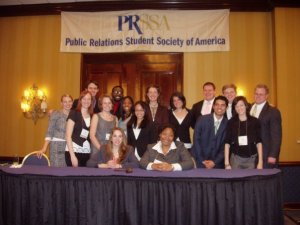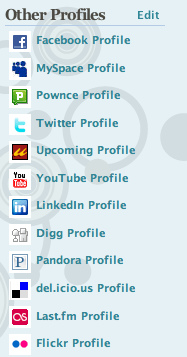-
I. Can't. Wait.
Filed under: Uncategorized
May 29, 2009 • 2:01 pm 0
Filed under: Uncategorized
May 28, 2009 • 9:18 pm 0
As I continue to transition in my new position with Edelman, one thing I’m already finding is I don’t have as much time in the day to peruse news articles and share them via Twitter, Friendfeed, etc. Trust me, I know this is a good thing. Technically, this is my first 40-hour per week gig; for the past couple of years, I’ve always balanced jobs and internships with classes, so I’m used moving around all day.
So, in an effort to continue to share what I feel is relevant to future and current PR pros, I’m going to try something new. I’m going to bookmark a couple articles per day via delicious and automatically post these to this blog. You can check out this feature here.
You know I love feedback, so let me know what you think. I’m here to help, and I hope this will be another tool that will accomplish that.
Filed under: Social Media, delicious, edelman, friendfeed, internship, twitter
May 27, 2009 • 9:17 pm 2
If I asked you who to define what a leader is, how would you do it? Would you say it’s the person in the corner office leading your company? Would you say it’s a member of a professional organization you’re involved with? Would you say it’s an intern in your company?
When I think of what I leader is, a lot of qualities come to mind — dedication, knowledge, attitude, aptitude — and these are probably some you would agree with. However, one prerequisite a leader does not need to have is a title. That means no matter what position you have within a company, whether it’s an intern, assistant or coordinator, you can be a leader.
Here are some tips for effective leadership, especially for students, interns and new professionals. Sure, these might sound like general career tips, but being a leader in the workplace is an entirely different mindset. Check them out and see how you can apply these principles in your office.
Attitude is everything
When you walk into work every morning, you can be a leader by motivating and inspiring with your attitude. Don’t let challenges get you down and look at new projects with a positive attitude. Hopefully, your attitude will be contagious and people will look to you for a pick-me-up when they need it. This creates a great work atmosphere.
Earn respect by doing what you say you’ll do
How many times have you offered help to a coworker and not followed through? I’ve done it before, and I know it doesn’t help with your credibility. Be honest with your coworkers and mean what you say — this will help you earn credibility and trust with your coworkers, and these are two traits leaders have a strong command of.
Learn and understand when to say yes — and no
There are only so many hours in the day, and at a certain point you can only take on so many projects. If you’re already swamped and can barely get through your daily to do list, it probably isn’t a good idea to take on a new project. That said, don’t be afriad to push yourself to do more. The point is there is a fine balance of doing a lot at work and not being able to get through your work. If you can demonstrate your ability to know the difference, you will definitely impress your coworkers and managers.
Give compliments a lot
You really can’t go wrong telling someone you think they did a good job or how much you appreciate their work. This is especially true of your managers and supervisors. Don’t be afraid to give a high-five to your boss if they did a good job. Chances are, your bosses probably don’t get praised for their work because they standards are higher, so go the extra couple of yards. Again, it goes back to attitude.
Promote teamwork, especially among those who don’t know each other
I didn’t realize it, but I let the e-board of MSU PRSSA formulate into pairs who always worked with each other. Looking back on the past year, I think a more effective approach would have been to encourage teams with the members who didn’t know each other as well. Also, you can take the initiative to get to know other people in your company. You never know who might be sitting next to you tomorrow.
Find ways to learn and grow with everything
As a young professional, you’re going to make mistakes. In fact, as you progress with your career, you’ll probably still make mistakes. In most cases, it’s not what you do, it’s how you react to the situation.Value professional development and always learn. It’s a great way to give more value to your company and your coworkers.
For more on effective leadership techniques, check out this slideshow from Andy Hanselman. There are some great tips in here for everyone:
So, what do you think? Can young professionals really be leaders?
Filed under: Internships, Professional Development, career, internship, leadership, office, workplace
May 25, 2009 • 1:58 pm 0
Two things have been keeping me away from blogging: moving to Chicago and applying for Teahan awards for the MSU PRSSA Chapter. Our group had a particularly great year, so one of the things we did to recap the year was put together a video.
The highlights:
-We were names Outstanding Professional Student Organization of the Year by the MSU Department of Student Life
-Our Bateman team finished second in the country — sweet!
-We got some national recognition for our innovative social media practices here
-We’re all over the Web — check us out on our Web site, follow us on Twitter, view our photostream here and watch videos we make here
Overall it was a great year and I got to work with some pretty incredible people. Although I won’t be on the board next year (per my duties on the national level), I’ll be there in spirit. Good luck guys!
Filed under: PRSSA, Bateman, flickr, msuprssa, PRSSA, teahan awards, twitter, youtube
May 19, 2009 • 11:16 am 4
With the end of the school year comes the first for something new: the first day on the job. I wholeheartedly believe that first impressions are incredibly important, especially in the workplace. If you can manage to make a solid first impression to your supervisor and coworkers, you will be off to a great start at your job or internship.
Here are some of my reminders when it comes to making a first impression:
Preparing for the first day
Just because you got the job doesn’t mean you should stop researching the company. Make sure you know about big events relating to the company and the industry in general. Keep on with Google Alerts, subscribe to the company’s blog or news feed and read industry publications to make sure you know what’s up. You never know who you’ll meet the first day!
Appearance
What you’re wearing and how well you take care of yourself really speak louder than words. Before the first day, make sure you get in contact with an employee of the company and see what the dress code is. There’s nothing worse than wearing a suit when everyone else is casual, and when you’re not comfortable, you won’t be able to perform.
 What to expect
What to expect
Come to your first day with an open mind and get ready for anything. With some companies, you might have an orientation for the entire day. With other companies, you might have a brainstorming meeting, a writing project and some media clipping to do. Chances are you’ll be entering a fast-paced work environment, especially at an agency, where you will have to jump right in. Get to know the people around you and ask them how you can help. By asking questions and becoming familiar with the clients, you’ll be able to be a more effective practitioner.
Lunch
Will your new coworkers take you out to lunch? Will you all eat in the lunchroom together? Will you eat at your desk? Be prepared for anything. I recommend bringing a lunch – something that you can keep for another day in case you go out.
When to leave?
When you’re trying to figure out when to leave, make sure you’re not staring at the clock wondering when you can get the heck out. That said, it might be overkill to stay hours past closing. The best thing you can do is understand when you’ll be expected to stay and make one more call or answer one more e-mail before heading out.
For more general tips on interning, check out my post here. For some other great articles on first days, check out these:
What tips do you have for those of us coming to the first day of a new job (myself included)? Any good stories to share?
Photo by mikebrown3506 on Flickr.
Filed under: Internships, Professional Development, brazen careerist, career, first days, Internships, jobs, pr internship, Public Relations, tips
May 17, 2009 • 5:53 pm 0
Besides moving out of East Lansing and complaining about the whole thing, I’ve been up to some pretty cool things. With classes finished for the semester, I’m starting to get my summer plans in order. Part of this is making the move to Chicago, and this will be my first summer away from East Lansing since I started at Michigan State University. I’ll also be starting an internship with Edelman in their digital group, as well as starting my National PRSSA position. In the interest of being open and transparent, you’ll probably be seeing more about the following:
I just moved out of my house last week. While I’ve lived here, the house has been broken into, we’ve had sewage problems, our kitchen has been remodeled and we had unwanted pets (never figured out what the scratches in the walls were), among other things. Even though the house was literally falling apart, I’m going to miss this place and mostly the front porch.

Recently, I was elected National Vice President of Professional Development by PRSSA at the National Assembly in New Orleans. In that position, I’ll be blogging at the PRSSA Blog, supporting student-run firms across the country and some other pretty cool things. I’ll also be traveling to Scottsdale in June with the other National Committee members to plan for the upcoming year and get things going. Here’s a picture of the 2008-2009 and 2009-2010 National Committees:

Also, I’m going to be moving to Chicago for the summer and interning with Edelman Digital. I’m starting right after Memorial Day and I can’t wait. The team has a blog and I hope you check it out. Below is a picture of where I’ll be for the summer.

So, what’s the future of this blog? Because I’m blogging at a few other places, I probably will only have time for one post per week. I’ve covered a lot of “tips” for PR students, and I hope to discuss issues we’ll be facing and how to addresses them in addition to more posts about the industry. Thanks for reading and I hope you keep up with me.
Filed under: Uncategorized, chicago, east lansing, edelman, edelman digital, msu, PRSSA, prssa national committee
May 13, 2009 • 5:06 pm 5
One thing I see more and more often is students who use different social networks for different reasons. For example, using Facebook for a crazy college lifestyle and keeping a professional blog. To me, it doesn’t make sense. Here’s why.
You’re findable
Even if you’ve changed your name on Facebook or use some kind of alter ego for other social networking profiles, don’t risk it. Here are some stats from an MSNBC article I want to throw out:
“According to a March survey by Ponemon Institute, a privacy think tank, 35 percent of hiring managers use Google to do online background checks on job candidates, and 23 percent look people up on social networking sites. About one-third of those Web searches lead to rejections, according to the survey.”
When it comes down to it, there are many more applicants to any one job, so don’t hurt your chances by taking a risk online.

Linking up
When I put up the new design on my blog, I added my Facebook profile badge. Before, I always thought Facebook was for my personal friends because I have personal information on there, but isn’t that the case with any social networking site you’re part of? Now, I’m open to networking on any of my profiles. Once you get over the initial “I want to post something really inappropriate” hill, it’s not so bad and helps your reputation in the long run.
Remember when Facebook changed and everyone thought it looks like Twitter? And Friendfeed‘s recent makeover to make it look more like Twitter? I think social networks are going to continue to converge (to some extend). Networking professionally on one site but avoiding conversation on another just plan looks bad.
Choose one side
When Facebook opened up to more than those with a .edu address and I started getting friend requests from professionals, I quickly learned about the importance of keeping a professional online profile — no matter what you’re using.
I recommend choosing one side; there’s no point of using some sites professionally and some sites for fun. This, of course, brings up the question of authenticity: do you have to show a different personality that who you really are? Not at all — just keep your illegal habits out of sight.
Be smart
I’m sure many of you already know what you put online is open for anyone to view. I just want to emphasize how important it is to be consistent and clear with your social networks. You never know, it might end up helping you get a job.
So, do you use different social networks for different reasons? Why? Do you think college students should be in a different category since they will be looking for jobs? All thoughts and comments are appreciated.
Filed under: Professional Development, Social Media, career, facebook, friendfeed, internship, job, social networks, twitter
May 11, 2009 • 10:00 am 2
During the past couple of weeks, I wrote a series of posts on how to prepare for PR in college. The advice was directed at a hypothetical freshmen about to enter PR studies in college, though the advice can be applied to different parts of a career in the field. Now, I want to write to a more realistic crowd — the sophomores, juniors, seniors and new graduates who just found PR.
Before I start giving some advice, I want to make it clear that you don’t need to have four years of solid PR experience in college to get a job when you graduate. Sure, it would be nice to do all of the things I mentioned in the other posts, but is it completely realistic to do what I recommend each year? Not for everyone. If you start PR even as late as senior year, you can still get off to a great start to your career. Here is what I recommend:
Draw on past experiences
If you were pre-med, philosophy, math or even underwater basket weaving, it’s important to draw upon past experiences and apply them to the public relations field. Chances are, if you majored in biology before you changed to public relations, you have some interest in science or technology. The great part about this is you can use this to your advantage. As a public relations practitioner, you’ll probably represent a company or organization that does things the public won’t understand — and that is where you come in. When you can bring a specialized background to the PR industry, it makes you that much more valuable.
Tip: Apply what you’re learning in other classes to your PR career — it will help you to be a more effective practitioner.
Get solid public relations experience
Although you may be worried about catching up in classes, especially if you changed majors later in college, it’s important to immediately seek solid opportunities that will help you enhance your public relations skills. You will be able to get the most out of an internship if you have a mentor guiding you throughout your time with that company/organization and if the program is somewhat structured. Sure, there are exceptions to those, but if you can find a company with some talented professionals and value their interns, you will probably have a good experience.
Something I forgot to put in my last posts is a list of resources of finding an internship. So, here are some great places to start:
Tip: Find several diverse experiences before you graduate in order to make yourself more marketable and find out what you want to do in your career.
Get active in social networks
The beauty of using Twitter, Facebook, Friendfeed and others for professional use is the ability to build your network so easily. Reach out to public relations professionals, especially at companies you would like to work for, and communicate with them. Another really good place to be is PROpenMic. It’s a network for public relations students, practitioners and faculty members — check it out.
With all of the joining and networking you will do, it’s important to maintain a sense of professionalism. Talking about how drunk you got during the weekend on your Facebook profile used to be OK when Facebook was just for college students. That’s not the case anymore. Know that what what you put online is fair game for potential employers and bosses to read, so make sure you think about what you post.
Tip: Get online and start participating in conversations. You’ll be surprised at how much you can learn from a strong online network.
Get active in PRSSA immediately
Even though it might be intimidating to join an organization with students already active in their profession, know that many people are in your same shoes. Here is my advice on how to maximize your PRSSA membership later in college:
Tip: Get active in PRSSA immediately and start building a network of students and professionals.
No excuses, play like a champion
Is studying public relations at all like Wedding Crashers? Maybe. I like this quote and I think it applies to this situation perfectly. Even though you joined the game a little late, it doesn’t mean you have to stay miles behind the rest of the crowd.
Tip: Don’t make excuses — get active in the public relations industry.
And here is what my Twitter network had to say:
@kellee_m Start networking as soon as you can online, in person, in class and in student organizations.
@sheesidd Immerse yourself in social media & read trade publications like PR Week.
@heatherhuhman Intern ASAP – it will help you land an entry-level job after college sooner. Plus, it will confirm your interest in the field.
@aribadler The best thing you will ever learn is that you haven’t learned enough, so never consider your learning completed.
@maryhenige Need to understand business in order to advise C-suite clients.
@aubzim join PRS(S)A, volunteer, write! Never too late for gaining experience. Work on worthwhile causes; don’t spread yourself too thin
@ssiewert you don’t need 5 internships to succeed! Immerse yourself in the industry, get involved in PRS(S)A, build a network, write a lot.
@AmberMShinn Me: late-in-college PR person. Tips: Get as much varied PR work experience as possible; be willing to volunteer to get it.
What advice do you have for PR students getting active later in the game?
Filed under: Internships, Professional Development, PRSSA, Public Relations, career, class, college, entry level pr, facebook, friendfeed, Internships, jobcenter, propenmic, prsa, PRSSA, Public Relations, twitter
May 4, 2009 • 11:22 am 10
I’m writing a four-part blog post on how to have a successful collegiate career for those interested in public relations. I’m basing this largely off my own experiences (a lot of what I’m including reflects what I wish I would have done during college, particularly in my early years) and those in my network. Please share and comment — with enough feedback, I may write another revised post.
You’ve made it to senior year! The most important thing to keep in mind about being a senior is to keep up the hard work throughout the entire year. Don’t get lazy, keep up the job search, join PRSA and enjoy your last year in college. Here are my tips for a successful senior year:
Maximize your PRSSA membership
Believe it or not, you can still genuinely benefit from a PRSSA membership during senior year. The most important thing to keep in mind, job or not, is that joining PRSA is the key to continuing your professional development. Keep that in mind as you go through the year and prepare to graduate. Here’s what I would do to maximize your PRSSA membership senior year:
Tip: After years in PRSSA, the best thing to do is continue your professional development and join PRSA. Keep learning!
Don’t be afraid of post-graduate internships
Finishing up your senior year, you will probably looking for full time positions with your dream company. It’s important to be aware that you will probably have to intern with a company before you work for them. There are, of course, exceptions to this, but I wouldn’t count on you being the exception. Also, even though you might have had four or five internships in college, you still might be to intern with the company before a full time position. That’s OK, too.
The reason for this is simple economics: for any one open public relations entry level position, there will be a ton of applicants, so the employer can be more selective. That means they can have their top candidates “try out” for the position before hiring them on full time.
Tip: Don’t rule out post-graduate internships and don’t be surprised if you get offered one. This is the company’s way of making sure you’ll be a good fit and will do well full time.
Avoid senioritis like the plague
I’ll be honest: I think senioritis is the biggest crock of BS I’ve ever heard. It’s a state of mind and you will only get this “disease” if you let it happen. So, to make sure you have a productive year, surround yourself with highly motivated and hard working folks. Make sure you remember that just because you’re a senior doesn’t mean you can stop trying.
Tip: Don’t get lazy and pride yourself on the work you accomplish senior year.
Understand strategy and work a campaign from start to finish
One of the biggest differentiators between a tactical PR professional and a strategic PR professional is their understanding of “why.” That said, working a campaign from start to finish can be one of the most beneficial things a student can experience.
There are a couple different ways to get this kind of experience. One way is to participate in the Bateman competition through PRSSA. Another way is to stay in an internship for more than a semester. Even if you can’t take part in these above experiences, you can learn about strategy simply by asking your supervisor “why.” Why is a press release going out after the media advisory? Why write three blog posts per week instead of five? Why target this audience? These are all questions you can be asking those you work with in order to better understand public relations strategy.
Tip: Enhance internships and other PR activities by understanding and taking part in public relations strategy.
Know how to network
I mentioned this in one of the previous posts and I hope you listened! The best kind of network is one that you don’t need at that moment, so if you have been building a solid network for the past couple of years, the job search process shouldn’t be long and painful. Remember that networking is not about how someone else can help you; it’s about how you can help someone else. If you help a professional with a freelance project, or volunteered some time to help, that’s what real networking is all about. Continue to build a strong network, even if you’re planning on leaving the area. The PR community is smaller than you think, and local professionals might be able to help you in other areas.
Tip: Hopefully you have been building a strong network for the past several years so you can get advice from mentors and look in the right places during the job search.
Patience, grasshopper
In case you didn’t know, the public relations industry is not really like other industries. Companies usually don’t consistently recruit a certain number of graduates each year. Also unique to the public relations industry is you probably can’t show up to a career fair without knowing anyone and land an internship after. Getting a job in public relations takes a lot of time and work, and chances are you probably won’t find a job before you graduate. The key here is patience — don’t let the job search distract you from finishing up the year strong.
Tip: During the job search, keep your chin up, don’t get too discouraged and know that something will find you.
And for this last post, here is what my Twitter network had to say:
@MelissaHackett (she cheated and wrote three!): Well, I will be a PR senior next year and I think it’s important to realize that it is your LAST year in college. If you haven’t been, become very active in organizations. Soak in as much experience as possible before graduating. In this economy, you need more than a degree. You need skills, and you get those through experience.
@beckyjohns Reach out to people in your network that can be professional mentors. Having a sounding board is so helpful in a job search. Try to involve yourself with as many different types of PR as possible. Use the skills you’ve developed to become well-rounded.
@rossmanmckinney Learn to write w/3 c’s: be crisp, clear, concise. Be curious, ask questions. work ur butt off. do everything!
@kellee_m Start sending out resumes early in the year so agencies have you on their radar. Apply again when you graduate.
@FrancoPRGroup Graduating PR seniors MUST have great writing skills! also need to find a way to distinguish themselves..what makes them unique?
@samemac Work harder than you ever have before. Try something new and dream big.
@heatherhuhman Apply for internships and entry-level jobs simultaneously. You never know what opportunities you might uncover.
Filed under: Professional Development, PRSSA, Public Relations, Bateman, career, college, graduate, networking, pr intern, prsa, PRSSA, Public Relations, senior, senioritis
Recent Comments